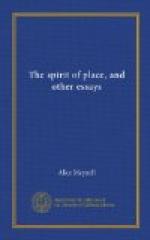It needs no park. It is to be found in the merest working country; and a thicket may be as secret as a forest. It is not so difficult to get for a time out of sight and earshot. Even if your solitude be enclosed, it is still an open solitude, so there be “no cloister for the eyes,” and a space of far country or a cloud in the sky be privy to your hiding-place. But the best solitude does not hide at all.
This the people who have drifted together into the streets live whole lives and never know. Do they suffer from their deprivation of even the solitude of the hiding-place? There are many who never have a whole hour alone. They live in reluctant or indifferent companionship, as people may in a boarding-house, by paradoxical choice, familiar with one another and not intimate. They live under careless observation and subject to a vagabond curiosity. Theirs is the involuntary and perhaps the unconscious loss which is futile and barren.
One knows the men, and the many women, who have sacrificed all their solitude to the perpetual society of the school, the cloister, or the hospital ward. They walk without secrecy, candid, simple, visible, without moods, unchangeable, in a constant communication and practice of action and speech. Theirs assuredly is no barren or futile loss, and they have a conviction, and they bestow the conviction, of solitude deferred.
Who has painted solitude so that the solitary seemed to stand alone and inaccessible? There is the loneliness of the shepherdess in many a drawing of J.F. Millet. The little figure is away, aloof. The girl stands so when the painter is gone. She waits so on the sun for the closing of the hours of pasture. Millet has her as she looks, out of sight.
Now, although solitude is a prepared, secured, defended, elaborate possession of the rich, they too deny themselves the natural solitude of a woman with a child. A newly-born child is so nursed and talked about, handled and jolted and carried about by aliens, and there is so much importunate service going forward, that a woman is hardly alone long enough to become aware, in recollection, how her own blood moves separately, beside her, with another rhythm and different pulses. All is commonplace until the doors are closed upon the two. This unique intimacy is a profound retreat, an absolute seclusion. It is more than single solitude; it is a redoubled isolation more remote than mountains, safer than valleys, deeper than forests, and further than mid-sea.
That solitude partaken—the only partaken solitude in the world—is the Point of Honour of ethics. Treachery to that obligation and a betrayal of that confidence might well be held to be the least pardonable of all crimes. There is no innocent sleep so innocent as sleep shared between a woman and a child, the little breath hurrying beside the longer, as a child’s foot runs. But the favourite crime of the sentimentalist is that of a woman against her child. Her power, her intimacy, her opportunity, that should be her accusers, are held to excuse her. She gains the most slovenly of indulgences and the grossest compassion, on the vulgar grounds that her crime was easy.




